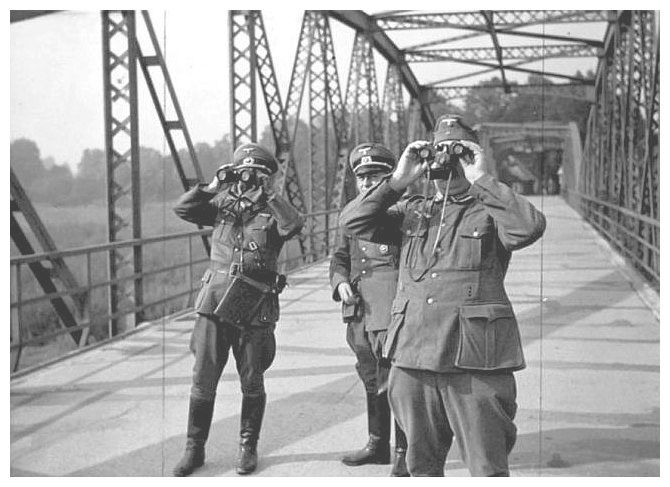 Sudeten Germans knock down the Czech border post separating it from Germany
Sudeten Germans knock down the Czech border post separating it from GermanyTHE SUDETEN CRISIS
Before 1938, Britain had already given way to Hitler on a number of occasions, but it was the events of the Sudeten crisis which showed appeasement in action – trying to buy off Hitler by giving way to his demands.
On 11 March 1938, Hitler invaded Austria. It was clear he wanted to do the same in the Sudetenland.
On 7 September 1938, the German Sudeten Party demanded union with Germany.
There were riots.
German newsreels showed ‘evidence’ of Czech ‘atrocities’ against the Sudeten Germans.
Hitler threatened to support the Sudeten Germans with military force.
Then Chamberlain intervened.
Chamberlain met Hitler at Berchtesgaden
Hitler promised him that this was the ‘last problem to be solved’.
Chamberlain decided Hitler was ‘a man who can be relied upon’.
He persuaded the Czechs to hand over the Sudetenland.
Chamberlain met Hitler at Bad Godesberg
Hitler made more demands.
At first Chamberlain refused, but then he decided that Czechoslovakia was not one of the ‘great issues’ which justified war, but just ‘a quarrel in a far-away country between people of whom we know nothing’.
Britain and France met Hitler again and made a Pact with him at Munich (29 September).
They gave the Sudetenland to Germany.
On 30 September, Chamberlain returned to England with his famous piece of paper. ‘I believe it is peace for our time’, he told the cheering crowd.
Czechoslovakia was not even invited to the talks. The Czechs were free to fight if they wished, but they had no support. They chose not to fight.
On 1 October 1938, Hitler marched unopposed into the Sudetenland. He said that it was the start of a 1000-year German Reich (empire).
 |
| http://www.johndclare.net/images/Roadto2.gif |
British cartoonist Low shows how Hitler became more powerful as Western leaders showed no spine
 Chief of Wehrmacht general Brauchitsch salutes a parade by German tanks to celebrate the ceding of Czech Sudetenland into Germany. October 1938.
Chief of Wehrmacht general Brauchitsch salutes a parade by German tanks to celebrate the ceding of Czech Sudetenland into Germany. October 1938. Sudeten Germans of the town of Ash (which was predominantly German) welcome German soldiers
Sudeten Germans of the town of Ash (which was predominantly German) welcome German soldiers Polish Marshal Edward Rydz-Smigly and the German Attache, Colonel von Bogislava Studnitz greet each other at a parade of "Independence Day" in Warsaw on November 11, 1938. less than a year later Poland would cease to exist.
Polish Marshal Edward Rydz-Smigly and the German Attache, Colonel von Bogislava Studnitz greet each other at a parade of "Independence Day" in Warsaw on November 11, 1938. less than a year later Poland would cease to exist. Polish troops occupy the Czech village Jörg during the operation of the annexation of the Czech area of Spisz.
Polish troops occupy the Czech village Jörg during the operation of the annexation of the Czech area of Spisz.CZECHOSLOVAKIA CEASES TO EXIST
Chamberlain essentially sacrificed Czechoslovakia on the altar of appeasement. In exchange for the Sudetenland, Hitler promised to guarantee the new Czech borders. Eduard Benes immediately resigned, and Czechoslovakia would not be guaranteed. Parts of the country were broken off by Poland and Hungary, and on March 15, 1939, German troops entered Prague. Czechoslovakia ceased to exist.
 Polish tanks roll into the Czech town of Tesin
Polish tanks roll into the Czech town of Tesin A Polish and German soldier exchange pleasantries on the bridge near Bohumin
A Polish and German soldier exchange pleasantries on the bridge near Bohumin German officers watch as Poland occupies the Czech town of Bohumin
German officers watch as Poland occupies the Czech town of Bohumin






